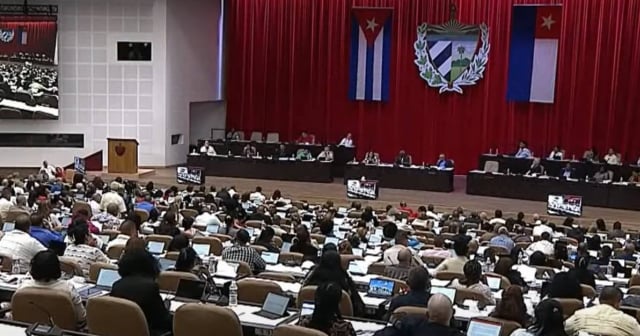A deputy to the National Assembly of People's Power (ANPP) said, during one of the sessions of that body held in recent days at the Palace of Conventions in Havana, that the U.S. embargo on Cuba is the main cause of the migratory exodus experienced on the Island.
"Emigration has always existed, it is normal and it is legitimate and valid for people to seek and choose a life project outside their country," said the deputy for the Mantua municipality in Pinar del Río, Yamila González Ferrer, in the presence of the ruler Miguel Díaz-Canel and the president of the ANPP Esteban Lazo Hernández.
"However, in our case..., we must keep in mind that the migration to other countries and the increase we are witnessing today is one of the cruelest and most inhumane effects of the intensification of the blockade that the government of the United States imposes on our people,” the deputy noted, ignoring the repression and economic hardships caused by the policies of her government, beyond the U.S. sanctions.
Nevertheless, González Ferrer continued reading his speech, mentioning family separations and trying to place the blame on external factors rather than the living conditions in which Cuba finds itself.
"Cuban families are resilient and reinvent themselves in many ways to bridge distances and stay united," expressed with the calmness of a person presenting a coherent argument.
Apparently, the deputy conveniently forgot that remittances from the Cuban diaspora play a crucial role in the island's economy. These money transfers not only support thousands of families but also constitute a source of foreign currency for the regime.
And it is important to note that those who do not receive them represent the sad figure of "7 out of 10 Cubans have stopped having breakfast, lunch, or dinner, due to lack of money or food shortages," as recently reported in the VII Report on the State of Social Rights in Cuba 2024, presented by the Cuban Observatory of Human Rights (OCDH).
In the mentioned report, the non-governmental organization highlighted that "89% of Cuban families suffer from extreme poverty," one percentage point more than last year and 13% more than in 2022.
In that regard, the words of the deputy come in the context where the regime approved, unanimously by its Parliament, two controversial laws that have raised concern among Cubans residing abroad.
The Citizenship Law is a rule without legislative precedent in Cuba, aimed at developing the constitutional principles related to citizenship, reflecting the rights of citizens, and reinforcing the power of the State.
The other is the Immigration Law, which according to regime spokespeople complements immigration legislation, regulates the care, protection, and documentation of foreigners, equating their rights and duties to those of Cuban citizens, and establishing the procedures for their expulsion from national territory, if necessary.
An independent demographic study, accessed by the Efe agency, indicated that the Cuban population fell by 18% between 2022 and 2023, reaching 8.62 million people.
The estimate is based on the number of Cubans who have arrived in the United States between October 2021 and April 2024, totaling 738,680 people, according to official information released by U.S. authorities that combines visas, paroles, and irregular arrivals.
The cited source revealed that “from there, the total number of migrants is extrapolated, taking into account the percentage of Cubans who are heading to the U.S. compared to the total number of people leaving the country for any destination, which for 2022 and 2023 the author estimates at 33% based on historical trends.”
This would result in a total number of migrants for the period 2022-2023 of 1.79 million people, an unprecedented figure in Cuban history.
What do you think?
COMMENTFiled under:
